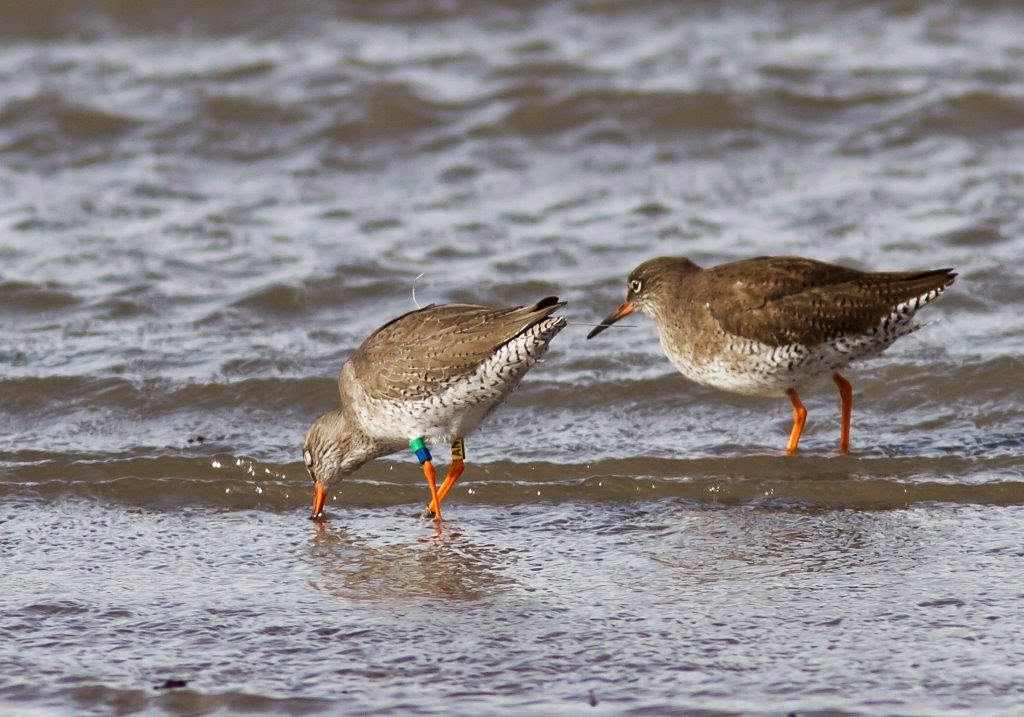As the
Dublin Bay Birds Project approaches its second winter, we are getting
reacquainted with our colour-ringed waders. As well as getting to know the
individuals, their haunts and habits in Dublin Bay, we are also beginning to
see the real benefit of our ringing efforts. Our birds have
been reported from as far away as Scotland, Iceland and Norway.
While colour-ringing (and subsequent re-sightings) generate valuable data, we are also fitting a subset of the birds with radio-transmitters in order to get a finer level of detail. The first of the radio-transmitters were deployed last January , and a mammoth radio-tracking effort followed. We collected some high resolution data on eleven radio-tagged birds, both by day and by night, during high and low tides.
Radio-tracking continued into the spring, and by early April, we could no longer pick up the signals from any of the Oystercatchers or Bar-Tailed Godwits. The last of the Redshanks stuck around until the last week in April, before heading north into the unknown.
While colour-ringing (and subsequent re-sightings) generate valuable data, we are also fitting a subset of the birds with radio-transmitters in order to get a finer level of detail. The first of the radio-transmitters were deployed last January , and a mammoth radio-tracking effort followed. We collected some high resolution data on eleven radio-tagged birds, both by day and by night, during high and low tides.
Radio-tracking continued into the spring, and by early April, we could no longer pick up the signals from any of the Oystercatchers or Bar-Tailed Godwits. The last of the Redshanks stuck around until the last week in April, before heading north into the unknown.
| Helen and Niall Radio tracking last winter |
Out of sight, but never out of mind, we focused on terns for the summer
months. But the colour-ringed and radio-tagged birds were never far from our
minds: where were they breeding; had a winter feeding on Sandymount Strand
allowed them to get into breeding condition; did they breed successfully; when
would they arrive back in Dublin again?
.png) |
| Oystercatcher re-sighting locations (red) Oystercatchers ringed as Pulli in Scotland and colour ringed in Dublin (green) Ringing location (blue) |
We checked
emails eagerly, waiting for news from birders and researchers from far away
with unpronounceable names. With time, the emails trickled in from far off
places…
Among the
jet setters were Redshank "BH", who was re-sighted in Iceland’s western fjords on the 18th
May, and Bar-tailed Godwit “DH", who was re-sighted in Finnmark, Norway a day later,
on May 19th. Oystercatcher “CU” was seen (on a traffic island!) in Stokksetri in Iceland. His mate was subsequently colour-ringed as part of an Icelandic
study. Who knows where she will spend the winter?
 |
| Redshank "BH" (yellow), Bar-Tailed Godwit "DH" (green) re-sighting locations Ringing location (blue) |
The database
has almost reached 1,000 re-sightings, which is fantastic, and we’d like to
sincerely thank everyone who has submitted records to date. These re-sightings
are the life-blood of the project.
Of the 151
Oystercatchers that we ringed, 89% have been re-sighted at least once, and 66%
of have been seen three times or more. Ten of them have been seen outside
Ireland. Oystercatcher “FI" has been re-sighted in Dublin 23 times, and
takes the crown for most regularly recorded colour-ringed bird. "FU"
and "BC" come in at a close second, with 21 re-sightings each.
 |
| Redshank "AN" ringed and radio tagged John Fox |
We were
delighted to catch up with Oystercatchers, "NA" and "CH,"
and Redshanks, "AN" and "AP" in recent weeks. These guys
have played a pivotal role in our data collection, as they carried
radio-transmitters for us last winter. Great to see them back in Dublin again!
We are
looking forward to the coming months and getting out and re-sighting more and
more of our birds. We will continue
to build a picture of their movements both within the bay and further afield.
As always, we would love to hear from you and integrate your re-sightings
into our growing database. It’s a great way to spend an autumnal day, and
anyone can do it (but a scope or camera helps). If you do manage to get out and
about, you can submit your sightings here.
No comments:
Post a Comment